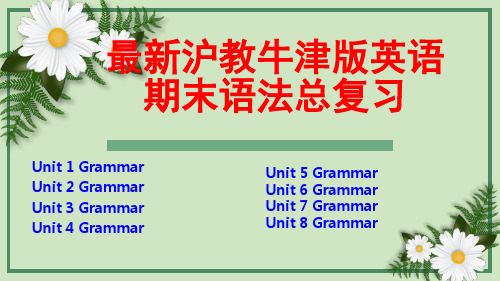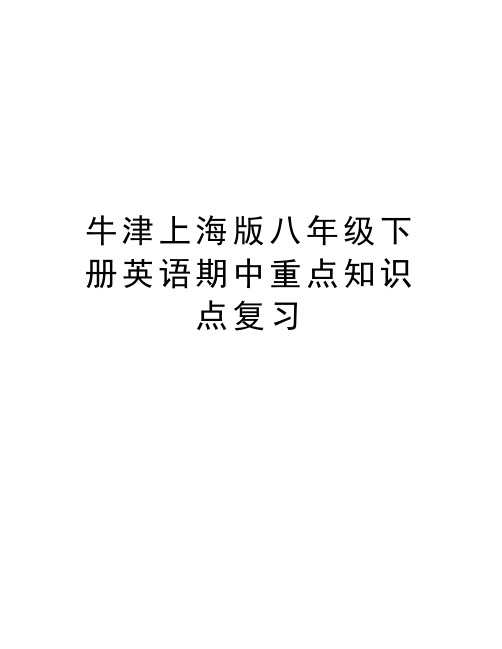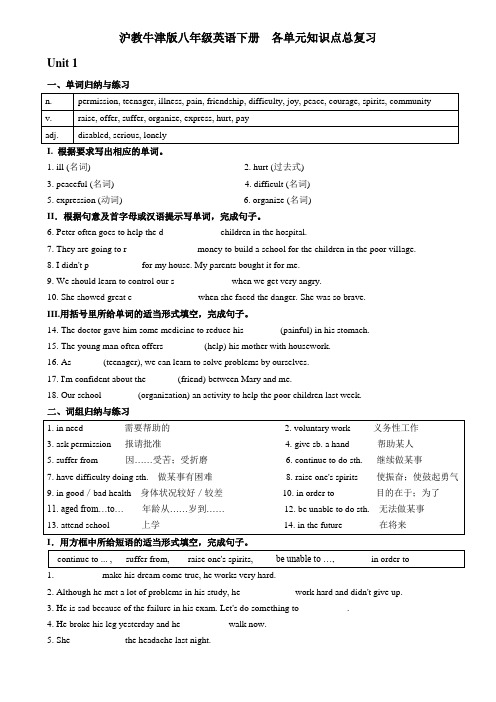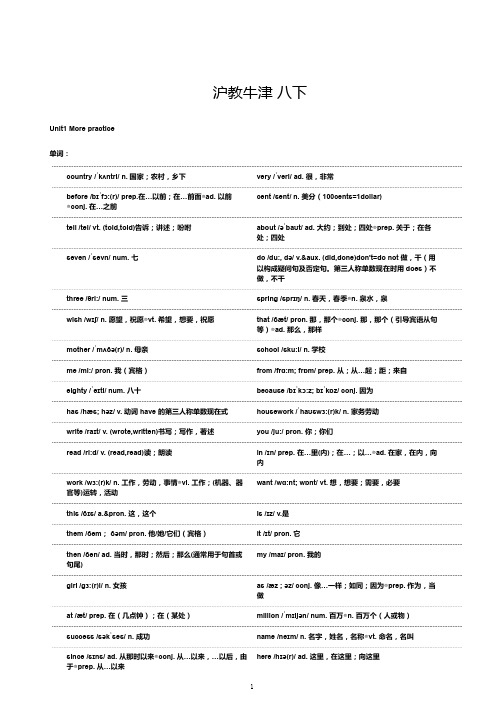牛津上海版八年级初二下册英语 第11讲-语法复习及阅读-教案
最新沪教牛津版英语版英语八年级下册语法总复习

the Wolong Panda Reserve, because it allows people
___B___ closer to them.
A. get
B. to get
C. getting
D. got
【点拨】allow sb. to do sth. “允许某人做某事”。
13. (易错题) —Mr Wu has recommended many books.
Have you decided ___B___ first?
—Yes. The Little Prince.
A. how to read
B. which to read
C. when to read
D. where to read
【点拨】“特殊疑问词+动词不定式”的结构。
14.【 中考·青岛】Teachers expect all their students ___A___
五、短文填空。 stop, talk, offer, ask, keep, give, save, be, help, lose
Dear Dad, I’m writing this letter __to__ta_l_k__21 about a problem with
you. I can’t stop thinking about my uncle and how he died. In fact, I seriously want to ask you __to__s_to_p__ 22 smoking. Smoking is the second biggest cause of death in the world.
to music and she often goes to concerts. 2. Have you finished __r_e_a_d_in__g__ (read) the book? 3.【 中考·云南】The young should do meaningful things
牛津上海版八年级下册英语期中重点知识点复习教案资料

牛津上海版八年级下册英语期中重点知识点复习八年级下英语期中重点知识点复习教案复习要点1. Word TransformationUnit2Unit3Unit 42. PhrasesU11. be interested in= have(great)interest in sth/doing sth 对…有(浓厚的)兴趣2. show(great)interest in sth/doing sth 对…表现出(浓厚的)兴趣3. fight for/against…为…/反对…而战4. have a fight with sb 与…打架5. take a deep breath 深呼吸6. one another = each other 互相7. air pollution 空气污染 noise pollution 噪音污染壤污染water pollution 水污染 soil pollution土壤污染8. be known as = be famous for 以…而出名9. release A into B 将A释放到B中take A from B 从B中取出A10. of course = certainly 当然U21.clean up 净化2.have/take a good rest (好好)休息一下3.a sewage plant 污水处理厂4.in reply to …作为对…的答复5.a water treatment works 自来水厂6. make (no)reply (不)作答复7.in the first place 首先,最初8. pure(A)into B)(把A)倒入(B)9.enjoy the view 欣赏风景enjoy +yourselves 玩的愉快enjoy +n或+V-ing 欣赏…喜欢…10.look around=look round 环顾四周look词组拓展:look for 寻找look like…看起来像…look after 照顾look up and down 上下打量look up…查阅look out=watch out小心;留神look down on sb 轻视;瞧不起look forward to +V-ing 盼望U 31.change…into…把…改变成…2.different kinds of energy 不同种类的能量3.heat energy 热能4.moving energy 动能5.light energy 光能6.sound energy 声能7. a dangerous servant 一个危险地仆人8. a packet of sweets 一袋糖果9.trick sb. 戏弄某人U4 hold a meeting/be at the meeting 举行会议decide to do sth. 决定做某事the chief editor 主编suggest that sb. (should) do sth. 建议某人做某事vote for 投票(支持)elect sb. to be 选举某人做……take charge of 管理;掌管ought to do sth. 应该做某事take notes 记笔记be responsible for 对…负责make a list of sth. 列……的清单have an idea 想出主意think about…考虑关于…make a decision about 做关于…的决定agree to do sth. 同意做某事arrange to do sth. 安排做某事U1-U4 基础练习1. Fill in the blanks with the given words in their proper forms.1. The boy is lying on the bed ____________ (comfortable) and listening to music.2. My brother is always ___________ (patient) when he is doing his homework, sohe always makes mistakes.3.The man's _____________ (work) became famous after he died.4.The boss has a plan to use fewer workers to do _________ (much) work.5.Ken's voice sounded ____________(puzzle) when he heard a strange voice.6. We cleaned our ________ (chemical) lab yesterday afternoon.2. Choose the best answer1. the sixteenth of August, they arrived in London.A. OnB. InC. AtD. By2. There is “x” in the word, and it’s second letter in the word.A. an, theB. a, aC. the, anD. the, the3. I’m old enough to wash ________ clothes by myself. You can just wash ________.A. my; yourB. mine; yourC. my; yoursD. your, my4. There are more than three different trees in the forests.A. thousands ofB. thousand ofC. thousandsD. thousand5 Not only his parents but also his brother to Lucky Island twice.A. have beenB. have goneC. has beenD. has gone6. I think beef better than pork.A. was tastedB. tastedC. is tastingD. tastes7. It’s hard to keep the house with three kids.A. cleaning.B. to cleanC. cleanedD. clean8. Trees are important to us. Trees cool the air clean it.A. as well asB. so better asC. as good asD. as better as9. A: The teacher told Charles late for school again. .A. not to beB. not beC. don’t beD. not to10. Whales are one of in the world.A. largest animalsB. the largest animalsC. largest animalD. the largest animal3. Grammar第一单元现在进行时现在进行时的标志:1.句中有副词now时,,常表示动作正在进行,这时要用现在进行时。
沪教版八年级英语下册--各单元知识点及复习

沪教牛津版八年级英语下册各单元知识点总复习Unit 1一、单词归纳与练习I. 根据要求写出相应的单词。
1. ill (名词) ____________________2. hurt (过去式) ____________________3. peaceful (名词) ____________________4. difficult (名词) ____________________5. expression (动词) ____________________6. organize (名词) ____________________ II.根据句意及首字母或汉语提示写单词,完成句子。
6. Peter often goes to help the d____________ children in the hospital.7. They are going to r_______________ money to build a school for the children in the poor village.8. I didn't p___________ for my house. My parents bought it for me.9. We should learn to control our s____________ when we get very angry.10. She showed great c______________ when she faced the danger. She was so brave.III.用括号里所给单词的适当形式填空,完成句子。
14. The doctor gave him some medicine to reduce his _______ (painful) in his stomach.15. The young man often offers ________ (help) his mother with housework.16. As ______ (teenager), we can learn to solve problems by ourselves.17. I'm confident about the ______ (friend) between Mary and me.18. Our school _______ (organization) an activity to help the poor children last week.二、词组归纳与练习I.用方框中所给短语的适当形式填空,完成句子。
)沪教牛津版初中英语八年级下册全套教学案

)沪教牛津版初中英语八年级下册全套教学案一、教学目标:1. 熟练掌握该课程的重点词汇和短语。
2. 能听懂和口语交流本单元所学知识。
3. 提高阅读能力,学习阅读技巧。
4. 培养动手实践能力,积极参与课堂活动。
二、教学重点与难点:1. 了解词汇的意思和用法以及本单元的重点短语。
2. 熟悉阅读技巧,提高阅读能力。
3. 培养动手实践能力,使学生更好的理解和掌握本单元知识。
三、教学内容:1. 重点单词:weight, health, rarely, regularly, profit, competition, instruction, presentation, energy, relaxed, nervous, fitness, concentrate, coordinate2. 重点短语:lose weight, give instructions, take part in, be relaxed, be nervous, energy drinks, figure out3. 阅读技巧:skimming and scanning4. 课堂活动:口语交际练习、听力练习、阅读理解练习、实践活动。
四、教学方法:1. 情境教学法2. 演示教学法3. 互动式教学法五、教学过程:1. 导入通过放一段视频或图片,引起学生的兴趣和好奇心,用自己的话简要描述其中的人或事。
2. 自主学习要求学生阅读或朗读本单元的课文,听音频或看视频,注意课文中的重点词汇和短语。
学生在自主学习的过程中,可以采用自己的方式,如读或背单词、模仿或演绎对话,或通过画画或电脑录制等形式来加深印象。
3. 互动探究根据所学内容进行互动探究,学生可以通过组合或匹配单词和短语来练习。
也可以进行角色扮演,让学生在实际情境中运用所学语言。
4. 实践活动通过实践活动的方式,让学生更加深入的了解所学单词和短语的应用场景。
如制作海报、口头介绍健康饮食、设计健身计划、动手制作健身用品等等。
沪教牛津 初中 英语 八年级下册(八下)

country/ˈkʌntri/n. 国家;农村,乡下very/ˈveri/ad. 很,非常before/bɪˈfɔ:(r)/prep.在…以前;在…前面◎ad. 以前◎conj. 在…之前cent/sent/ n. 美分(100cents=1dollar)tell/tel/vt. (told,told)告诉;讲述;吩咐about/əˈbaʊt/ad. 大约;到处;四处◎prep. 关于;在各处;四处seven/ˈsevn/num. 七do/du:, də/v.&aux. (did,done)don't=do not 做,干(用以构成疑问句及否定句。
第三人称单数现在时用 does)不做,不干three/θri:/num. 三spring/sprɪŋ/n. 春天,春季◎n. 泉水,泉wish/wɪʃ/n. 愿望,祝愿◎vt. 希望,想要,祝愿that/ðæt/pron. 那,那个◎conj. 那,那个(引导宾语从句等)◎ad. 那么,那样mother/ˈmʌðə(r)/n. 母亲school/sku:l/n. 学校me/mi:/pron. 我(宾格)from/frɑ:m; frɒm/ prep. 从;从…起;距;来自eighty/ˈeɪti/num. 八十because/bɪˈkɔ:z; bɪˈkɒz/conj. 因为has/hæs; həz/v. 动词 have 的第三人称单数现在式housework/ˈhaʊswɜ:(r)k/n. 家务劳动write/raɪt/v. (wrote,written)书写;写作,著述you/ju:/pron. 你;你们read/ri:d/ v. (read,read)读;朗读in/ɪn/prep. 在…里(内);在…;以…◎ad. 在家,在内,向内work/wɜ:(r)k/n. 工作,劳动,事情◎vi. 工作;(机器、器官等)运转,活动want/wɑ:nt; wɒnt/ vt. 想,想要;需要,必要this/ðɪs/a.&pron. 这,这个is/ɪz/v.是them/ðem; ðəm/pron. 他/她/它们(宾格)it/ɪt/pron. 它then/ðen/ ad. 当时,那时;然后;那么(通常用于句首或句尾)my/maɪ/pron. 我的girl/gɜ:(r)l/ n. 女孩as/æz ; əz/ conj. 像…一样;如同;因为◎prep. 作为,当做at/æt/prep. 在(几点钟);在(某处)million/ˈmɪljən/ num. 百万◎n. 百万个(人或物)success/səkˈses/n. 成功name/neɪm/n. 名字,姓名,名称◎vt. 命名,名叫since/sɪns/ad. 从那时以来◎conj. 从…以来,…以后,由于◎prep. 从…以来here/hɪə(r)/ad. 这里,在这里;向这里沪教牛津八下Unit1 More practice单词:other/ˈʌðə(r)/pron. 别人,别的东西◎a. 别的,另外的for/fɔ:(r); fə(r)/prep. 为了…;向…,往…;与…交换;防备…;适合…;因为…;在…期间;对于…;对…来说◎conj. 因为,由于I/aɪ/pron. 我life/laɪf/n. (复lives)生命;生涯;生活;人生;生物lot/lɑ:t; lɒt/n. 许多,好些how/haʊ/ad. 怎样,如何;多少;多么teacher/ˈti:ʧə(r)/n. 教师,教员are/ɑ:(r); ə(r)/v.是China/ ˈʧaɪnə/n. 中国and/ænd; ənd/conj. 和;又;而of/ɒv; əv/prep. (表示所属,数量,其中)…的now/naʊ/ad. 现在class/klɑ:s/,/klæs/n. (学校里的)班;年级;课a/ə; eɪ/art. 一(个、件…)one/wʌn/pron. 一(个,只…)◎num. 一start/stɑ:(r)t/v. 开始,着手;出发go/gəʊ/ vi. (went,gone)去;走;驶;通到;到达◎n. 尝试also/ˈɔ:lsəʊ/ad. 也(做某事)room/ru:m/n. 房间,室;空间;地方many/ˈmeni/ pron. (比较级more,最高级most)许多人(或物)◎a. 许多的way/weɪ/n. 路,路线;方式,手段stay/steɪ/n.&vi. 停留,逗留,呆home/həʊm/n. 家◎ad. 到家;回家the/ði:; ðə/art. 这(那)个,这(那)些(用于特定人或物,序数词,最高级,专有名词,世上独一无二事物前)special/ˈspeʃəl/a. 特别的,专门的help/help/n.&vt. 帮助,帮忙with/wɪð,wɪθ/prep. 关于;带有;以;和;用;有paid/peɪ/v. (paid,paid)付钱,给…报酬◎n. 工资thing/θɪŋ/n. 东西;(复)物品,用品;事情,事件to/tu: ; tə/prep. (动词不定式符号,无词义);(表示接受动作的人或物)给;对,向,到;在…之前age/eɪdʒ/n. 年龄;时代return/rɪˈtɜ:(r)n/ v. 归还,回,归first/fɜ:(r)st/num. 第一◎a.&ad. 第一;首次;最初◎n. 开始;开端文章:1. Success for Spring Buds2. My name is Feng Guixiang.3. I want to tell you about the China Children and Teenagers' Fund (CCTF) and how it helped me.4. One of the CCTF's special activities is the Spring Bud Project.5. In 1989, 4.8 million children in the country, aged from seven to fourteen, were unable to attend school.6. Eighty-three per cent of them were girls.7. Because of this, the CCTF launched the Spring Bud Project to help them.8. Since then, the project has helped millions of girls return to school.9. It has also built a lot of schools.10. The very first Spring Bud class was here in Guangxi in 1989.parent /ˈperənt; ˈpeərənt/ n. 父(母),双亲very /ˈveri/ ad. 很,非常bring /brɪŋ/ vt. (brought,brought)拿来,带来,取来paint /peɪnt/ n. 油漆◎vt. 油漆,粉刷,绘画during /ˈdjʊərɪŋ/,/ˈdʊrɪŋ/ prep. 在…期间;在…过程中three /θri:/ num. 三without /wɪˈðaʊt/ prep. 没有leg /leg/ n. 腿;腿脚;支柱offer /ˈɒfə/,/ˈɑ:fər/ n. 提供;建议these /ði:z/ a.&pron. 这些music /ˈmju:zɪk/ n. 音乐,乐曲her /hɜ:(r)/ pron. 她(宾格),她的friend /frend/ n. 朋友near /nɪə(r)/ a.近的◎ad. 附近,邻近◎prep. 在…附近,靠近because /bɪˈkɔ:z; bɪˈkɒz/ conj. 因为lonely /ˈləʊnli/ a. 孤独的,寂寞的write /raɪt/ v. (wrote,written)书写;写作,著述they /ðeɪ/ pron. 他(她)们;它们;人们in /ɪn/ prep. 在…里(内);在…;以…◎ad. 在家,在内,向内work /wɜ:(r)k/ n. 工作,劳动,事情◎vi. 工作;(机器、器官等)运转,活动want /wɑ:nt; wɒnt/ vt. 想,想要;需要,必要understand /ˌʌndə(r)ˈstænd/ v.(understood,understood)懂得;明白;理解them /ðem ; ðəm/ pron. 他/她/它们(宾格)is /ɪz/ v.是it /ɪt/ pron. 它hurt /hɜ:(r)t/ vt. (hurt,hurt)伤害,受伤;伤人感情I /aɪ/ pron. 我accident /ˈæksɪdənt/ n. 事故,意外的事lot /lɑ:t; lɒt/ n. 许多,好些are /ɑ:(r); ə(r)/ v.是have /hæv; həv/ vt. (had,had)有;吃;喝;进行;经受disabled /dɪsˈeɪbld/ a. 残废的,残疾的illness /ˈɪlnəs/ n. 疾病a /ə; eɪ/ art. 一(个、件…)one /wʌn/ pron. 一(个,只…)◎num. 一spirit /ˈspɪrɪt/ n. 精神photo /ˈfəʊtəʊ/ n. =photograph 照片many /ˈmeni/ pron. (比较级more,最高级most)许多人(或物)◎a. 许多的picture /ˈpɪktʃə(r)/ n. 图片,画片,照片the /ði:; ðə/ art. 这(那)个,这(那)些(用于特定人或物,序数词,最高级,专有名词,世上独一无二事物前)11. The Spring Bud Project paid for me to attend that class.12. It also rented a room close to the school for me.13. Before the project started, I stayed at home and helped my mother with the housework.14. Going to school changed my life.15. I learnt to read and write and do many other things.16. Now I work as a teacher at a Spring Bud school here in Guangxi.17. I wish to help other girls the way the Spring Bud Project helped me.Unit1 Reading 单词:call/kɔ:l/n. 喊,叫;电话,通话◎v. 称呼;呼唤;喊,叫help/help/n.&vt. 帮助,帮忙meet/mi:t/vt. (met,met)遇见,见到◎n. 会;集会to/tu: ; tə/prep. (动词不定式符号,无词义);(表示接受动作的人或物)给;对,向,到;在…之前story/ˈstɔ:ri/n. 故事,小说but/bʌt; bət/conj. 但是,可是◎prep. 除了,除…外use/ju:z/vt. 利用,使用,应用tell/tel/vt. (told,told)告诉;讲述;吩咐do/du:, də/v.&aux. (did,done)don't=do not 做,干(用以构成疑问句及否定句。
沪教版八年级英语复习课教案

沪教版八年级英语复习课教案单元教学目标:1、words&phrases: robot, paper, less, fewer, simple, unpleasant, factory, seem, etc .2、will 形成的通常将来时态的陈述句、否定句、疑问句及提问.3、there be 句型的一般将来时.4、more , less , fewer 的用法.5、自学通常将来时态的有关科学知识,学会对未来展开预测.单元重难点:1、will 形成通常将来时态的句式。
2、there be 句型的通常将来时态。
3、more , fewer , less 的用法。
4、how to make predictions .第一课时教学步骤:step 1 leading in(引入话题,转化成背景科学知识)(引入话题,转化成背景科学知识)1.greetings: welcome to school .what’s the date today ? who’s on duty t oday ?do you enjoy your winter holiday ?(你喜欢你的寒假吗?)do you finish your homework(家庭作业) (你顺利完成你的假期作业了吗?)do you want to live on the moon ?(你想去月球吗?)can you guess what will happen in ten years ?(你能够猜到十年后将可以出现什么吗?)collect the ss’ answers and say something about their predictions .step 2 pre-task(任务前活动)sb page 2 ,1a .1.look at the picture :how will the world be different in the future , years from now ?we’re going to talk about sth in years .2.read each predictions to the class .explain the new vocabulary .3.read the instructions .make sure ss know what they should do .4.do it by themselves .5.talk about the answers with the class .explain :一般将来时态形成: will / be going to +动词原形=step 3 while-task(任务中活动)sb page 2 ,1b .1.practise reading the six predictions .2.read the instructions to ss .circle the things you hear on the recording .3.play the tape twice .(放录音,两次)4.play the tape a third time .at the same time ,check the answers .sb page 2 , 1c .1、pay attention to the dialogues .2、read the dialogues fluently .3、pairwork .work in pairs to make predictions according to the sample .4、ask several pairs to share their conversations to the class .sb page 3 , 2a & 2b .1、read the predictions .2、read the instructions and point out the sample answer .3、play the tape twice .ss circle the word they hear in each sentences: more , less , fewer .4、check the answers .学生探究: less , fewer 的区别。
牛津沪教版英语八年级下期末重点知识复习总结
牛津沪教版英语八年级下期末重点知识复习总结Unit 1: Will people have robots?- Key Vocabulary:- robot, prediction, challenging, improve, advanced, manual- monitor, household chores, vacuum cleaner, operate, programming- Grammar Points:- Future Perfect tense- Asking and answering questions with "Will" and "Won't"Unit 2: What should I do?- Key Vocabulary:- advice, donate, charity, positive, solve, effect, consequences- encouragement, situation, apologize, supportive, trustworthiness - Grammar Points:- Modal verb "should" for giving advice- Making suggestions with "Why don't...?" and "How about...?"Unit 3: Teenagers should be allowed to choose their own clothes- Key Vocabulary:- strict, argue, fashion, freedom, express, individuality, reasonable - uniform, appropriate, dress code, personal, decision, opinion- Grammar Points:- Expressing permission and prohibition with "should be allowed to" and "should not be allowed to"- Giving reasons using "because"Unit 4: Our world in the future- Key Vocabulary:- environment, pollution, population, renewable, energy- resources, global warming, greenhouse effect- Grammar Points:- Expressing future time using "will" and "going to"- Talking about future plans and predictionsUnit 5: Let's celebrate!- Key Vocabulary:- tradition, custom, celebrate, festival, occasion, gather- lantern, reunion, special, fireworks, delicious, fortune- Grammar Points:- Present continuous tense- Talking about future plans and arrangements using "going to" Unit 6: What are you doing to help others?- Key Vocabulary:- fund, support, organize, event, poverty, education- Grammar Points:- Present continuous tense for actions happening now- Asking and answering questions with "What" and "Where" Unit 7: What's in the news?- Key Vocabulary:- headline, article, journalist, report, interview- current, event, opinion, headline, broadcast, press- Grammar Points:- Using question words to ask about specific information- Present continuous and simple present tenses to describe news eventsUnit 8: How was your school trip?- Key Vocabulary:- adventure, trip, impressive, exciting, thrilling- fascinating, breathtaking, enjoyable, memorable, view- Grammar Points:- Describing events and experiences using adjectivesUnit 9: Our world heritage- Key Vocabulary:- heritage, monument, architecture, treasure, valuable- ancient, historical, preserve, protect, cultural, site- Grammar Points:- Past continuous tense for actions in progress in the past- Talking about past events and experiencesUnit 10: Life in the future- Key Vocabulary:- virtual reality, invention, gadget, access, revolution- Grammar Points:- Using "will" and "won't" for future predictions- Talking about future possibilities and changes以上是对牛津沪教版英语八年级下册期末考的重点知识进行的简要总结。
沪教牛津版初二下册英语知识点总结全册含习题和答案
沪教牛津版初二下册英语知识点总结全册含习题和答案本文档为初二下册英语知识点总结,旨在帮助学生巩固所学的知识。
以下是全册的知识点总结和题及答案。
单元一:School Life- 主要知识点:学校设施、学校日常活动- 题:1. What facilities does your school have?(答案根据实际情况)2. Describe a typical school day.(答案根据个人经历)单元二:Family Time- 主要知识点:家庭成员、家庭活动- 题:1. How many people are there in your family?(答案根据实际情况)2. Describe a family activity that you enjoy.(答案根据个人经历)单元三:Hobbies and Interests- 主要知识点:爱好和兴趣、表达喜欢与不喜欢- 题:1. What is your favorite hobby? Why?(个人回答)2. List three things you like and three things you don't like.(个人回答)单元四:Healthy Living- 主要知识点:健康生活方式、饮食和运动- 题:1. What do you do to stay healthy?(个人回答)2. Describe a healthy meal.(个人回答)单元五:Travel and Adventure- 主要知识点:旅行和冒险、地理和文化知识- 题:1. Describe a place you would like to visit and why.(个人回答)2. What is a famous landmark in your country?(个人回答)单元六:Technology and Innovation- 主要知识点:科技和创新、数字产品和服务- 题:1. How has technology changed your life?(个人回答)2. What is your favorite digital device or service?(个人回答)- 主要知识点:语言和交流、不同国家和文化的语言- 题:1. How many languages can you speak?(个人回答)2. List three words in a language other than English.(个人回答)单元八:Entertainment and Media- 主要知识点:娱乐和媒体、影视作品和音乐- 题:1. What is your favorite movie or TV show? Why?(个人回答)2. Describe a song or piece of music you like.(个人回答)以上是沪教牛津版初二下册英语的知识点总结和题及答案。
牛津译林英语八年级下册全册语法复习
牛津译林英语八年级下册全册语法复习牛津译林英语八年级下册全册语法复8B Unit1现在完成时的用法现在完成时有三种用法:1.表示过去发生的动作和现在有联系,即该动作对现在有影响。
例如:Have you had your lunch。
你吃过午饭了吗?Yes。
I have。
I've just had it。
是的,我吃了,我刚吃过。
(现在我不饿了)I have already posted those photos。
我已经邮寄了那些照片。
(那些照片现在已不在我这里了)2.表示从过去某一时间开始一直持续到现在(包括“现在”在内)的动作,并且表示一段时间的状语连用,谓语动词多用延续性动词。
例如:I've known him for 3 years。
我认识他已经3年了。
They have lived here since 1996.自从1996年以来他们一直住在这里。
3.表示到现在为止多次发生的动作。
例如:XXX twice。
这部电影他已经看过两遍了。
My XXX has told me the story several times。
我爷爷已经把这个故事给我讲了好几遍。
现在完成时的构成现在完成时的构成为:肯定句:主语 + have/has + 动词的过去分词 + 其他。
否定句:主语 XXX 动词的过去分词 + 其他。
一般疑问句:Have/Has + 主语+ 动词的过去分词+ 其他?肯定回答:Yes,主语 + have/has。
否定回答:No,主语 + XXX't。
需要注意的是,主语是第三人称单数时用has,其他人称用have。
例如:XXX has heard from his XXX。
XXX这个月已收到了他爸爸的两次来信。
We have already cleaned our classroom。
我们已经打扫了教室。
现在完成时的标志词现在完成时的标志词包括:already,yet,ever,recently,just,before(用于句末),so far,for + 一段时间,since + 过去时间或一般过去时的句子。
沪教牛津版八年级下册英语 Unit 1 3- Grammar 教案
课题: Unit 1 --- Helping those in need课时: 第 3 课时,共 4 课时课型: Grammar &More Practice教学目标:1) To help the students conclude the usage of Infinitives2) To enable the students to master the usage of Infinitives3) To teach students some language points4) To train students’ reading skill---read more practice by using skimming and scanning skill5) To broaden students’ eye sight of learning about mission教学重点: Learn some language points in More Practice教学难点: Teach students the grammar of Infinitives教学准备: PPT, Blackboard教学步骤:I. Grammar1. Guided Qs to answer questions:What is “Infinitive”?(什么是不定式?)Some verbs can have other verbs after them. We usually use to before the second verb. We call these second verbs infinitives.(有些动词后可以更其它动词,我们用to 放在第二个动词前,我们叫第二个动词为不定式)1)We often use to + infinitive after these verbs:我们经常在这些动词后面直接跟不定式做动词的宾语。
- 1、下载文档前请自行甄别文档内容的完整性,平台不提供额外的编辑、内容补充、找答案等附加服务。
- 2、"仅部分预览"的文档,不可在线预览部分如存在完整性等问题,可反馈申请退款(可完整预览的文档不适用该条件!)。
- 3、如文档侵犯您的权益,请联系客服反馈,我们会尽快为您处理(人工客服工作时间:9:00-18:30)。
教育1对3辅导讲义1、上次课后巩固作业复习;2、互动探索。
教学建议:1.检查预习思考部分的report完成情况;2.第一部分的图片让学生猜测标识所表达意思,旨在增加学生的交通常识;老师可以采取竞赛问答的形式,看谁能在最短时间内得出正确答案;3.第二部分的文章阅读前先设置问题,让学生带着问题去阅读。
问题如下:Why is traffic a big problem in big cities?What do many cities do to solve the problem?3.读后问题设置如下:Is traffic a big problem in Shanghai? Do you have any good ways to solve the problem?1. 这个标志的含义是什么?2. 这个标志有何含义?3. 这个标志有何含义?A.禁止左转B.此路不通C.禁止通行A.立体交叉直行和右转弯行驶B.立体交叉直行和左转弯行驶C.直行和左转弯行驶4. 这个标志有何含义?A.禁止借道B.禁止变道C.禁止超车备注:文章读后让学生找出文章中对写作有帮助的好词好句,并模仿造句。
Read and find out some useful information.There are more and more people and more and more cars.Traffic is a big problem in many cities around the world.Traffic is especially bad during rush hour --- the time whenpeople go to work or school and the time when they go home.Many people take buses, subways, or trains towork, but many other people drive their cars. As aresult, the streets are very busy, and traffic is very bad.Many cities are trying to solve their trafficproblems. Some cities are building more roads. Othercities are expanding their bus and subway systems.Many cities are trying to reduce the number ofcars on the their roads. Some highways have carpool lanes for cars with two, three, or more people. In some cities, people drive their cars only on certain days of the week.For example, in Athens, people with license plate numbers ending in 0 through 4 drive on some days, and people with numbers ending in 5 through 9 drive on other days.Every day around the world, more and more people drive to and from work in more and more cars. As a result, traffic is a global problem.教学建议:1.让学生在限定时间内完成阅读;2.让学生之间相互对答案;3.让学生自己解释和别人答案不同的题目以便老师了解学生的解题思路及错误原因;4.让错误较多的学生总结错误原因及注意事项。
5.概括文章的主旨大意,读文章时让学生养成从整体把握文章的习惯。
6.每篇文章找出1到2个优美句子,进行积累。
I. reading and speakingReading—Modern Transportation知识名称:阅读理解【知识梳理1】Like underground systems all around the world, there are two main rules on the London Underground: Please mind the gap and please give up your seat to a person carrying a child or heavy luggage.5. Speaking & Writing: Does modern transportation make our life easieror not?4. How does the writer support his argument? Do you agree with him or not and explain your reasons.3. What’s the main idea of each passage?2. Can you make at least 3 sentences with the words, phrases or sentencesmentioned above?1. Please underline some good words, phrases or sentences.Passengers wishing to buy train tickets from January 1, 2019 on will have to show identification (身份证明) a 3 the country. Adults can use ID cards or passports when buying tickets. Children under 16 who are taller than 1.5 m can also use student identification cards and household register (户口). Verification (证明) from a 1 4 police station works for kids, too.Under the real -name system, passengers will get tickets with their names and ID numbers printed on them. Part of the ID number is hidden to p 5 passengers' personal information.Miss Li, a teacher from Minzu University of China, is in charge of buying train tickets for students. He feels it's e 6 to buy tickets under the real -name system than before. "We successfully got tickets for 98 percent of students this year, last year we only got 85 percent," he said. However, the new system also faces challenges. Passengers now have to get to train stations earlier than before to have their identities checked. What's more, passengers need to look after their tickets carefully, so their personal information will not get into the wrong h 7 .Keys: 1. travel 2. solve 3. across 4. local 5. protect 6. easier 7. hands3.Joyce and her editors haven't decided when they will have a competition. (改为简单句)Joyce and her editors haven't decided_________ _________ have a competition.4.Jacky said to me, "Pass me the salt, please." (保持句意基本不变)Jacky told me to_________ the salt to_________.5.Take the maglev train, or you will be late for the plane. (保持句意不变)You__________ be late for the plane_________ you take the maglev train.6.I will call the police if that noise doesn’t stop soon. (保持句意基本不变)I will call the police__________ that noise _________soon.7.It was too cold for the driver to get the engine started. (保持句意基本不变)It was ________ cold that the driver ________ get the engine started.8.Both my sister and I like reading comic strips. (改为否定句)_________ of us reading comic strips.9.The removal man put the washing machine next to the fridge.(改为否定句)The removal man_________ _________ the washing machine next to the fridge.10.Chang'e II Rocket travelled to the moon at the speed of 7.9 kilometers per second. (划线提问)_________ _________ did Chang'e II Rocket travel to the moon?Keys: 1.does he 2. What an 3. when to 4. pass him 5. will unless6. unless stops7. so couldn’t8. Neither likes9. didn’t put 10. How fast(此部分测试时间为20分钟左右,讲评时间为15分钟左右。
